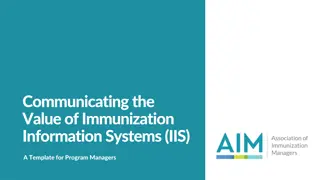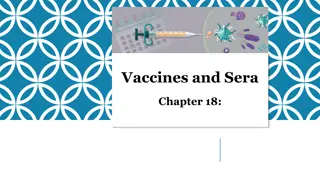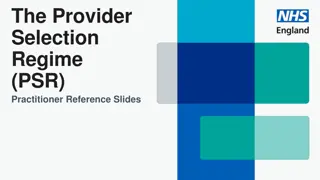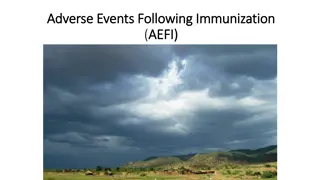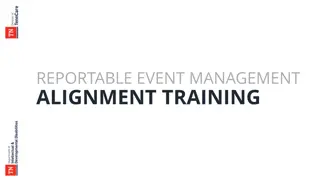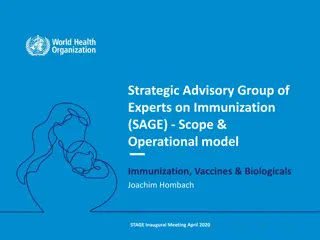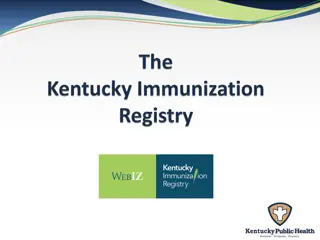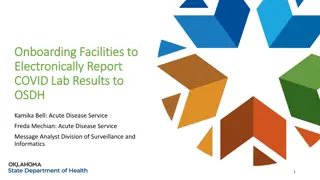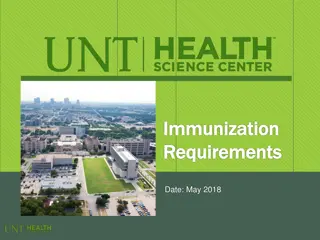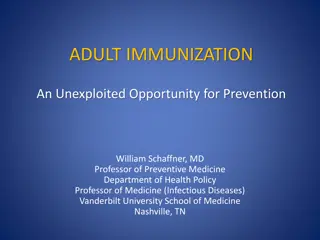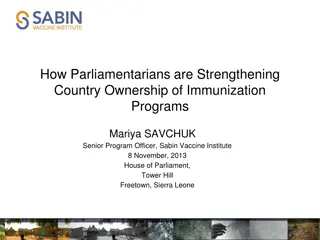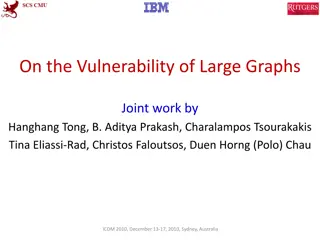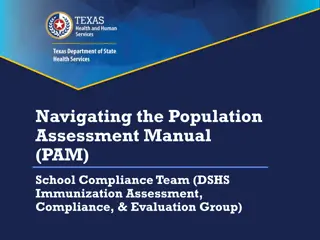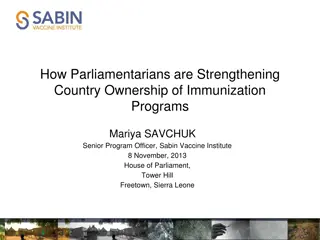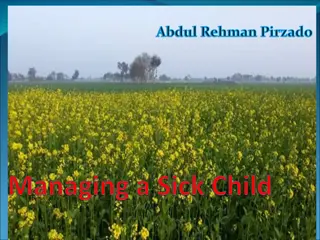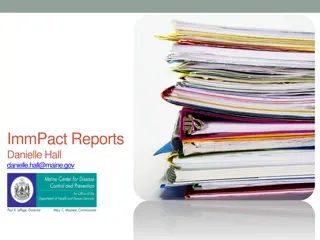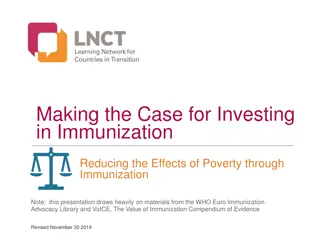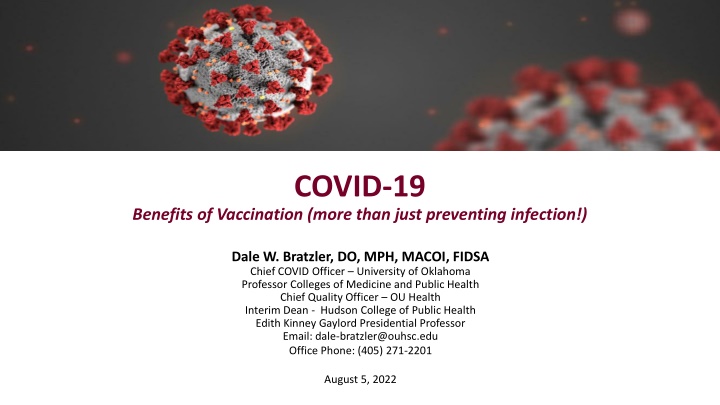
Benefits of COVID-19 Vaccination Beyond Infection Prevention
Discover the extensive benefits of COVID-19 vaccination outlined by Dr. Dale W. Bratzler, including protection from severe outcomes and insights from a large study of 1.2 million vaccinated individuals. Learn about the reduced risks associated with severe COVID-19 outcomes and the key risk factors for poor health outcomes. Explore how vaccination can significantly lower the chances of severe illness and death due to COVID-19.
Download Presentation

Please find below an Image/Link to download the presentation.
The content on the website is provided AS IS for your information and personal use only. It may not be sold, licensed, or shared on other websites without obtaining consent from the author. If you encounter any issues during the download, it is possible that the publisher has removed the file from their server.
You are allowed to download the files provided on this website for personal or commercial use, subject to the condition that they are used lawfully. All files are the property of their respective owners.
The content on the website is provided AS IS for your information and personal use only. It may not be sold, licensed, or shared on other websites without obtaining consent from the author.
E N D
Presentation Transcript
COVID-19 Benefits of Vaccination (more than just preventing infection!) Dale W. Bratzler, DO, MPH, MACOI, FIDSA Chief COVID Officer University of Oklahoma Professor Colleges of Medicine and Public Health Chief Quality Officer OU Health Interim Dean - Hudson College of Public Health Edith Kinney Gaylord Presidential Professor Email: dale-bratzler@ouhsc.edu Office Phone: (405) 271-2201 August 5, 2022
Do the Vaccines Work? What benefits can we discuss with the people we care for?
https://www.cidrap.umn.edu/news-perspective/2022/06/covid-19-vaccines-saved-estimated-20-million-lives-1-yearhttps://www.cidrap.umn.edu/news-perspective/2022/06/covid-19-vaccines-saved-estimated-20-million-lives-1-year
We all know fully vaccinated people who have gotten infected. So what s the benefit?
Very large study of 1.2 million people who had completed the primary COVID vaccinations between December 2020 and October 2021. https://www.cdc.gov/mmwr/volumes/71/wr/mm7101a4.htm
Bottom Line Findings Fully vaccinated persons were protected from most complications: - Risk of severe COVID-19-associated outcomes 0.015% - Risk of death 0.0033% (but a few 36 did die!) All persons with severe outcomes had at least one (out of eight) underlying risk factor for poor outcomes Of those who died, 78% had four or more risk factors. Severe COVID-19 outcomes were defined as hospitalization with a diagnosis of acute respiratory failure, need for noninvasive ventilation (NIV), admission to an intensive care unit (ICU) including all persons requiring invasive mechanical ventilation, or death (including discharge to hospice) https://www.cdc.gov/mmwr/volumes/71/wr/mm7101a4.htm
Eight Risk Factors and Oklahoma Prevalence Increased Risk of Severe Disease or Death* Risk Factor Oklahoma Rank or Prevalence > 65 years 3.2-fold higher risk ~635,000 (16% of population) Immunosuppressed 1.9-fold higher risk 3-4% of US population 4th in the nation 25th in the nation 9th highest in the nation for stroke Diabetes 1.5-fold higher risk Chronic kidney disease 1.6-fold higher risk Chronic neurologic disease 1.5-fold higher risk 1st in the nation 2nd in the nation Chronic cardiac disease 1.4-fold higher risk Chronic pulmonary disease 1.7-fold higher risk 5th in the nation Chronic liver disease 1.7-fold higher risk *In fully vaccinated individuals. Most ranking data from CDC: https://www.cdc.gov/nchs/pressroom/states/oklahoma/oklahoma.htm
Based on odds ratios, smokers were: 41% more likely to die 15% more likely to be on a mechanical ventilator 27% more likely to have a major cardiovascular event https://journals.plos.org/plosone/article?id=10.1371/journal.pone.0270763
mRNA Vaccine Effectiveness against laboratory-confirmed COVID-19 hospitalization (Age 50 and over) Vaccine Effectiveness Since Last Dose (days since last dose)* 80 73 55 Percent 22 2-doses (>= 150 days) 3-doses (7-119 days) 3-doses (>= 120 days) 4-doses (>=7 days) *During the Omicron BA.2/BA.2.12.1 predominant period. Link-Gelles R, Levy ME, Gaglani M, et al. Effectiveness of 2, 3, and 4 COVID-19 mRNA Vaccine Doses Among Immunocompetent Adults During Periods when SARS-CoV-2 Omicron BA.1 and BA.2/BA.2.12.1 Sublineages Predominated VISION Network, 10 States, December 2021 June 2022. MMWR Morb Mortal Wkly Rep. ePub: 15 July 2022. DOI: http://dx.doi.org/10.15585/mmwr.mm7129e1
JAMA Network Open. 2022;5(8):e2224657. doi:10.1001/jamanetworkopen.2022.24657
44% Reduction in Breakthrough Infections in matched recipients! JAMA Network Open. 2022;5(8):e2224657. doi:10.1001/jamanetworkopen.2022.24657
https://www.cdc.gov/coronavirus/2019-ncov/vaccines/booster-shot.htmlhttps://www.cdc.gov/coronavirus/2019-ncov/vaccines/booster-shot.html
https://www.cdc.gov/coronavirus/2019-ncov/vaccines/booster-shot.htmlhttps://www.cdc.gov/coronavirus/2019-ncov/vaccines/booster-shot.html
This study found that full vaccination against COVID-19 was associated with a reduced risk of AMI and ischemic stroke after COVID-19. In those fully vaccinated: 52% reduction in AMI 60% reduction in ischemic stroke JAMA Published online July 22, 2022.
Many viral infections increase the risk for blood clots! That COVID vaccines might prevent stroke and heart attack did not surprise me Seasonal influenza represents a major preventable threat to the health of persons with CVD. Clinical trials and observational studies have demonstrated that vaccination against influenza is associated with significantly reduced risk of cardiovascular death and nonfatal events. Vaccination is currently recommended for persons with diabetes, a condition common to patients with CVD. On the basis of this evidence, the AHA and ACC recommend inactivated influenza vaccination as a component of secondary prevention for persons with coronary disease and other atherosclerotic vascular conditions (Class I, Level B).
Our findings indicate that vaccines may lower transmission risk and, therefore, have a public health benefit beyond the individual protection from severe disease.
So, when I am asked why people should be vaccinated against COVID The vaccines do reduce the likelihood of infection. Most importantly, they reduce your risk of hospitalization, complications (including AMI and stroke), and death from COVID They reduce the likelihood of long-COVID syndrome (PACS) If you do get infected, they may reduce the chance that you spread the disease to someone else.
Finally, my long-term soap box. Far too often, we fail to provide indicated vaccines to patients that are in our care! Arch Intern Med. 2002;162:2349-2356.

